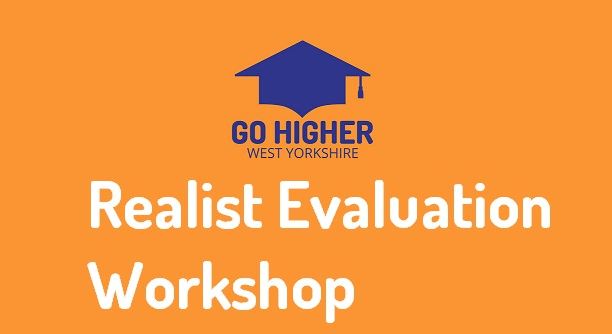Realist Evaluation Workshop

The Research and Evaluation Team were delighted to host a Realist Evaluation Workshop, held at Leeds Beckett’s Cloth Hall Court on Tuesday 1 May. The event was well-attended by colleagues from across the country, including members of the NCOP Data and Evaluation Group, the national NCOP Evaluation Team at CFE Research and the NEON Evaluation Working Group. It was a fantastic opportunity to network, to share resources and good practice, and to hear updates from Research and Evaluation teams at other consortia.
The event also provided a chance to learn more about the Realist approach that underpins our Evaluation Framework here at GHWY, and to share this with colleagues who use different approaches. We are especially grateful to our presenters, Dr Nick Emmel and Dr Adam Formby, for sharing their expertise. Both Nick and Adam are active members of the RealismLeeds network.
Nick kicked off proceedings with a really engaging introduction to Realism, drawing on his own research into patient pathways within the NHS. Adam then went on to show how this might be applied to Widening Participation. Realism, he explained, aims to establish why different outcomes happen in different contexts. We might know, for example, that introducing CCTV in a car park reduces car break-ins – but why does that happen? It’s not because the CCTV cameras are fighting crime themselves: on its own, CCTV doesn’t do anything. Instead, it’s because of several chain reactions. Perhaps would-be criminals notice that there are CCTV cameras, and this puts them off breaking into cars. Or perhaps people parking their cars spot the CCTV cameras, which reminds them about possible crime and prompts them to double-check that their car is locked. So in order to work out why the CCTV cameras have reduced crime, we need to look at broader contextual factors.
This is particularly appropriate to Widening Participation, Adam suggested, because the contexts in which we deliver our activities are so different: the schools we work with are diverse, as are the young people within those schools. So if a particular activity, such as a campus visit, works really well with one group of young people, we can look at lots of contextual data – where did the visit take place? What was the programme for the day? What experience of HE did the young people already have? What was the journey to the campus like? What did they have for lunch? – to try and work out exactly what made it so effective.
In the afternoon, Adam led a workshop where everyone could try their hand at brainstorming contextual factors and how they might affect the success of widening participation activities. We also shared the example of our GHWY Reflective Journal, which our HEPOs use to capture contextual information about any activity they run. This will provide crucial data for our evaluation.
Thanks to Adam, Nick, and to everyone who came and took part for making it a great and thought-provoking day!
